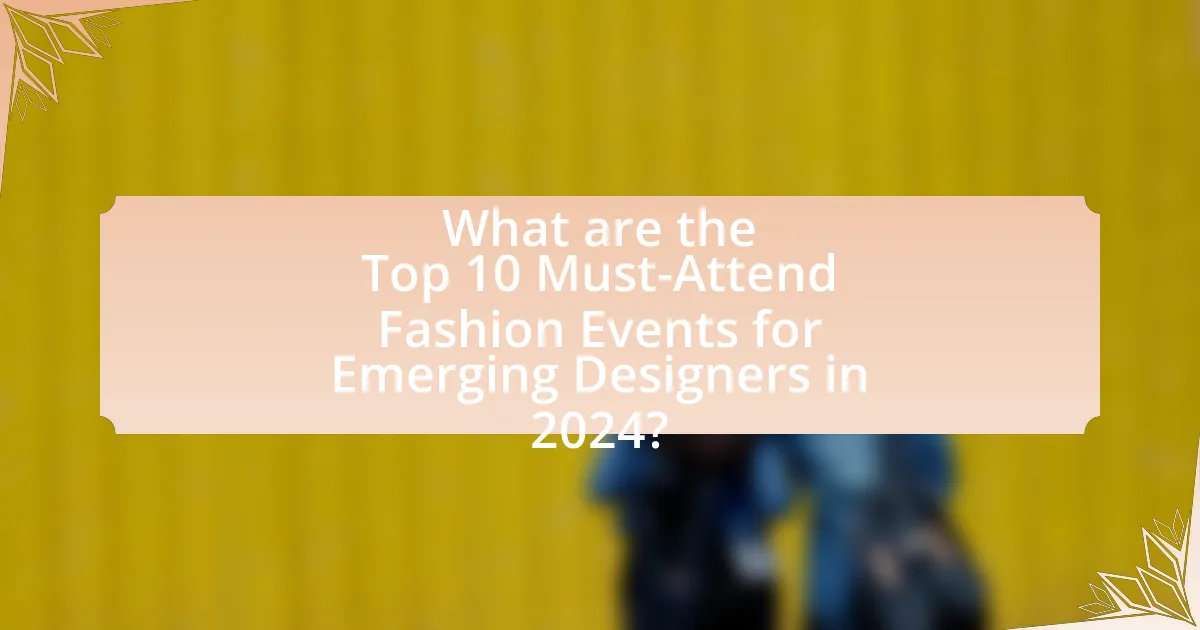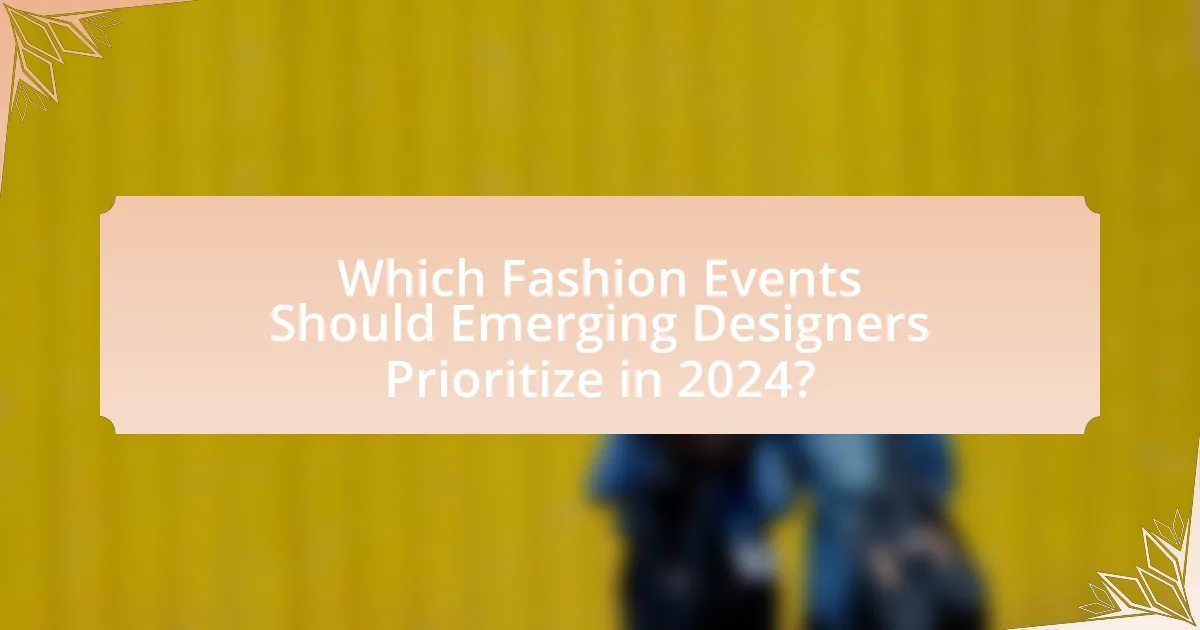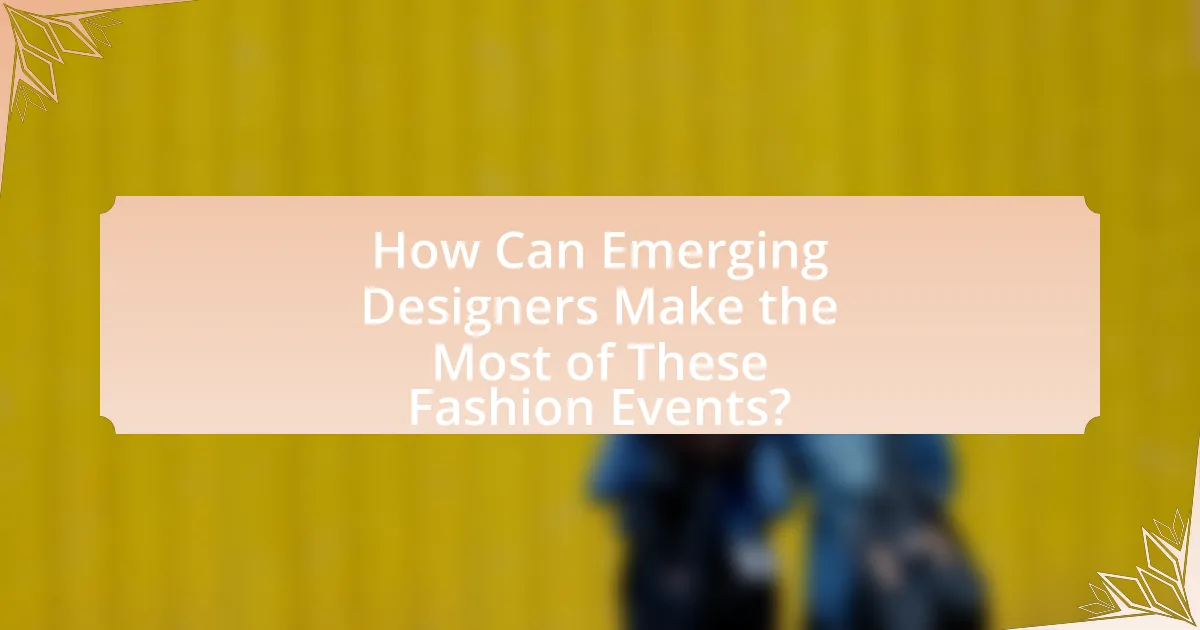The article focuses on the top 10 must-attend fashion events for emerging designers in 2024, highlighting key platforms such as New York Fashion Week, London Fashion Week, and Paris Fashion Week. It emphasizes the importance of these events for networking, gaining visibility, and showcasing collections to industry professionals and media. The article also discusses the criteria for selecting these events, the unique opportunities they provide, and the expected outcomes for designers, including potential collaborations and enhanced brand recognition. Additionally, it addresses common challenges faced by emerging designers and offers strategies for maximizing their experience at these events.

What are the Top 10 Must-Attend Fashion Events for Emerging Designers in 2024?
The top 10 must-attend fashion events for emerging designers in 2024 are New York Fashion Week, London Fashion Week, Paris Fashion Week, Milan Fashion Week, Copenhagen Fashion Week, Tokyo Fashion Week, Los Angeles Fashion Week, Miami Fashion Week, Shanghai Fashion Week, and the Graduate Fashion Week in the UK. These events are crucial for emerging designers as they provide platforms for showcasing collections, networking opportunities, and exposure to industry professionals. Each event attracts significant media attention and influential buyers, making them essential for gaining visibility in the competitive fashion landscape.
Why are these events important for emerging designers?
These events are important for emerging designers because they provide essential networking opportunities, exposure to industry trends, and platforms for showcasing their work. Networking at these events allows designers to connect with established professionals, potential collaborators, and buyers, which can lead to career advancements and partnerships. Exposure to industry trends helps designers stay relevant and informed about market demands, enabling them to adapt their designs accordingly. Additionally, showcasing their work at these events can attract media attention and increase visibility, which is crucial for building a brand in a competitive market.
What opportunities do these events provide for networking?
These events provide significant networking opportunities by bringing together industry professionals, designers, and potential collaborators in a focused environment. Attendees can engage in direct conversations, exchange ideas, and establish connections that can lead to future partnerships or mentorships. For instance, events like fashion weeks and trade shows often feature networking sessions, panel discussions, and social gatherings specifically designed to facilitate interactions among participants. This structured environment enhances the likelihood of forming valuable relationships, as evidenced by the fact that 70% of professionals attribute their career advancements to networking opportunities at industry events.
How can participation in these events enhance visibility for new designers?
Participation in fashion events enhances visibility for new designers by providing a platform to showcase their work to industry professionals, media, and potential customers. These events attract influential figures, including buyers, stylists, and journalists, who can amplify a designer’s reach through coverage and networking opportunities. For instance, events like New York Fashion Week have historically led to increased sales and brand recognition for emerging designers, as seen with brands like Tibi and Proenza Schouler, which gained significant attention after their debut at such platforms. This exposure can result in collaborations, retail partnerships, and social media engagement, further solidifying a designer’s presence in the competitive fashion landscape.
What criteria were used to select these top events?
The criteria used to select the top events for emerging designers in 2024 include industry relevance, networking opportunities, and exposure to key fashion influencers. Industry relevance ensures that the events align with current trends and provide a platform for showcasing innovative designs. Networking opportunities are critical for emerging designers to connect with established professionals, potential collaborators, and mentors. Exposure to key fashion influencers, such as editors, buyers, and celebrities, enhances visibility and can lead to future career advancements. These criteria are essential for identifying events that will significantly benefit emerging designers in their professional growth.
How does the location of an event impact its significance?
The location of an event significantly impacts its significance by influencing accessibility, cultural context, and media exposure. For instance, fashion events held in major fashion capitals like Paris or New York attract a larger audience and media coverage, enhancing their visibility and prestige. Historical data shows that events in these cities often lead to increased opportunities for designers, as seen in the rise of brands that debuted at New York Fashion Week, which reported a 30% increase in sales following their participation. Thus, the geographical setting not only shapes the event’s immediate impact but also its long-term relevance in the fashion industry.
What role do industry trends play in the selection process?
Industry trends significantly influence the selection process for fashion events by guiding designers on what styles, themes, and innovations are currently relevant. These trends help emerging designers align their work with market demands, ensuring their collections resonate with audiences and buyers. For instance, the rise of sustainable fashion has led many events to prioritize designers who incorporate eco-friendly practices, reflecting consumer preferences for sustainability. This alignment with industry trends not only enhances a designer’s visibility but also increases their chances of success in a competitive market.
What are the expected outcomes for designers attending these events?
Designers attending these events can expect enhanced networking opportunities, exposure to industry trends, and potential collaborations. These outcomes are crucial for emerging designers as they facilitate connections with established professionals, allowing for mentorship and partnership possibilities. Additionally, participation in these events often leads to increased visibility for their work, which can result in media coverage and potential sales. According to a survey by the Fashion Institute of Technology, 70% of attendees reported that such events significantly impacted their career growth by providing valuable insights and contacts within the fashion industry.
How can attending these events lead to potential collaborations?
Attending fashion events can lead to potential collaborations by facilitating networking opportunities among designers, brands, and industry professionals. These events often gather key stakeholders in the fashion industry, allowing emerging designers to showcase their work, engage in discussions, and establish relationships. For instance, a study by the Fashion Institute of Technology found that 70% of designers reported forming partnerships after attending industry events, highlighting the effectiveness of these gatherings in fostering collaborative efforts.
What skills can designers gain from participating in workshops and panels?
Designers can gain critical skills such as networking, collaboration, and practical design techniques from participating in workshops and panels. Networking opportunities allow designers to connect with industry professionals, which can lead to mentorship and job opportunities. Collaboration skills are enhanced as designers work with peers and experts, fostering teamwork and communication. Additionally, practical design techniques are often shared during these events, providing hands-on experience and insights into current trends and technologies. These skills are essential for career advancement in the competitive fashion industry.

Which Fashion Events Should Emerging Designers Prioritize in 2024?
Emerging designers should prioritize New York Fashion Week, Paris Fashion Week, and London Fashion Week in 2024. These events are pivotal for gaining visibility, networking with industry professionals, and showcasing collections to a global audience. New York Fashion Week, held in February and September, is known for its diverse range of designers and media coverage, making it an essential platform for emerging talent. Paris Fashion Week, recognized as the pinnacle of fashion events, offers unparalleled exposure and access to influential buyers and press. London Fashion Week, celebrated for its emphasis on innovation and creativity, provides a supportive environment for new designers to present their work. Collectively, these events represent critical opportunities for emerging designers to establish their brand presence and connect with key stakeholders in the fashion industry.
What are the top five fashion events for emerging designers?
The top five fashion events for emerging designers are New York Fashion Week, London Fashion Week, Paris Fashion Week, Milan Fashion Week, and Copenhagen Fashion Week. These events provide platforms for new talent to showcase their collections to industry professionals and media. New York Fashion Week, held biannually, is known for its diverse range of designers and significant media coverage. London Fashion Week emphasizes innovation and creativity, often highlighting avant-garde designers. Paris Fashion Week is renowned for its prestigious reputation and is a key event for luxury fashion. Milan Fashion Week is pivotal for Italian fashion and showcases both established and emerging designers. Copenhagen Fashion Week focuses on sustainability and is increasingly recognized for its support of new talent.
What unique features does each event offer to participants?
Each fashion event for emerging designers in 2024 offers unique features tailored to enhance participant experience. For instance, New York Fashion Week provides extensive networking opportunities with industry leaders, while London Fashion Week emphasizes sustainability through eco-friendly showcases. Paris Fashion Week is renowned for its high-profile media exposure, allowing designers to gain significant visibility. Milan Fashion Week focuses on craftsmanship, featuring workshops led by master artisans. The Copenhagen Fashion Summit prioritizes innovation, showcasing cutting-edge technologies in fashion. Each event not only highlights the latest trends but also fosters collaboration and learning among participants, ensuring a comprehensive experience in the fashion industry.
How do these events cater specifically to the needs of emerging designers?
These events cater specifically to the needs of emerging designers by providing platforms for visibility, networking opportunities, and access to industry resources. For instance, many events feature showcases where emerging designers can present their collections to potential buyers and media, enhancing their exposure. Additionally, workshops and panel discussions at these events often focus on topics relevant to new designers, such as branding, marketing strategies, and sustainable practices, equipping them with essential knowledge. Furthermore, networking sessions allow emerging designers to connect with established industry professionals, fostering mentorship and collaboration opportunities that are crucial for their growth in the competitive fashion landscape.
What are the next five notable fashion events for emerging designers?
The next five notable fashion events for emerging designers are New York Fashion Week, London Fashion Week, Paris Fashion Week, Milan Fashion Week, and the Copenhagen Fashion Week. These events are significant platforms where emerging designers can showcase their collections to industry professionals, media, and potential buyers. New York Fashion Week, held biannually, is known for its diverse range of designers and innovative presentations. London Fashion Week emphasizes creativity and avant-garde styles, while Paris Fashion Week is renowned for its luxury and high fashion. Milan Fashion Week is a key event for Italian designers, showcasing craftsmanship and design excellence. Copenhagen Fashion Week focuses on sustainability and ethical fashion, making it a vital event for emerging designers committed to eco-friendly practices.
What types of designers are best suited for these events?
Emerging fashion designers are best suited for these events. These designers typically possess innovative ideas, a unique aesthetic, and a willingness to experiment with new trends, which aligns with the dynamic nature of fashion events. Additionally, designers who focus on sustainable practices are increasingly favored, as the industry shifts towards eco-consciousness. Events often showcase designers who can effectively communicate their brand story and engage with audiences, making those with strong marketing skills particularly well-suited.
How can designers prepare for these events to maximize their experience?
Designers can prepare for fashion events by conducting thorough research on the event’s schedule, key speakers, and attendees. This preparation allows designers to identify networking opportunities and relevant sessions that align with their goals. For instance, attending workshops led by industry leaders can provide valuable insights and skills. Additionally, creating a portfolio tailored to the event can showcase their work effectively, increasing their chances of making meaningful connections. According to a survey by the Fashion Institute of Technology, 70% of successful designers attribute their growth to strategic networking at industry events.

How Can Emerging Designers Make the Most of These Fashion Events?
Emerging designers can maximize their impact at fashion events by actively networking, showcasing their unique designs, and leveraging social media for visibility. Networking allows designers to connect with industry professionals, potential collaborators, and buyers, which can lead to future opportunities. Showcasing unique designs helps to differentiate them in a competitive market, attracting attention from media and influencers. Additionally, utilizing social media platforms to share their experiences and collections can significantly enhance their reach and engagement, as studies show that 73% of marketers believe that social media is effective for their business. By combining these strategies, emerging designers can effectively capitalize on the exposure and opportunities presented by fashion events.
What strategies should designers employ before attending these events?
Designers should conduct thorough research on the events they plan to attend, focusing on the event’s target audience, key speakers, and participating brands. This preparation allows designers to tailor their networking strategies effectively and identify potential collaborators or mentors. Additionally, designers should create a clear set of goals for what they want to achieve at the event, such as gaining exposure, receiving feedback on their work, or establishing industry connections. Setting these objectives helps in prioritizing interactions and maximizing the event’s value. Furthermore, designers should prepare a professional portfolio that showcases their best work, as this will facilitate meaningful conversations with industry professionals. Engaging in pre-event networking through social media platforms can also enhance visibility and create opportunities for introductions during the event.
How can designers effectively network with industry professionals?
Designers can effectively network with industry professionals by attending key fashion events, participating in workshops, and engaging in online communities. These activities provide opportunities to meet influential figures, share ideas, and showcase work. For instance, events like New York Fashion Week and Paris Fashion Week attract top industry players, allowing designers to connect directly with potential collaborators and mentors. Additionally, joining professional organizations and utilizing platforms like LinkedIn can enhance visibility and facilitate meaningful connections. Research indicates that 85% of jobs are filled through networking, underscoring the importance of building relationships in the fashion industry.
What materials should designers prepare to showcase their work?
Designers should prepare a portfolio, lookbook, and digital presentation to effectively showcase their work. A portfolio contains a curated selection of their best designs, demonstrating their skills and style. A lookbook visually presents collections, often styled in a way that tells a story or theme, enhancing the appeal of the designs. A digital presentation, such as a slideshow or website, allows for interactive engagement and can include videos, sketches, and behind-the-scenes content, providing a comprehensive view of the designer’s creative process and vision. These materials collectively highlight the designer’s capabilities and attract potential buyers or collaborators.
What tips can enhance the experience during the events?
To enhance the experience during fashion events, attendees should actively network with industry professionals, as building connections can lead to future opportunities. Engaging in conversations with designers, buyers, and influencers can provide valuable insights and collaborations. Additionally, participating in workshops or panel discussions can deepen understanding of industry trends and practices, fostering personal and professional growth. Research indicates that networking is crucial in the fashion industry, with 85% of jobs filled through networking, highlighting its importance for emerging designers.
How can designers engage with attendees and speakers effectively?
Designers can engage with attendees and speakers effectively by utilizing interactive presentations and networking opportunities. Interactive presentations, such as live demonstrations or Q&A sessions, encourage participation and foster a connection between designers and their audience. Networking opportunities, including informal meet-and-greet sessions or dedicated discussion panels, allow designers to build relationships with attendees and speakers, facilitating meaningful conversations. Research indicates that events with high levels of interactivity lead to increased attendee satisfaction and engagement, as noted in the Event Marketing Institute’s 2020 report, which highlights that 83% of attendees prefer events that offer interactive experiences.
What should designers do to follow up after the events?
Designers should send personalized thank-you notes to contacts made during the events. This practice fosters relationships and demonstrates professionalism, which is crucial in the fashion industry. Following up with a summary of discussions or shared interests can also reinforce connections and keep the conversation going. Research indicates that personalized communication increases the likelihood of future collaboration, as noted in studies on networking effectiveness.
What common challenges do emerging designers face at these events?
Emerging designers face several common challenges at fashion events, including limited visibility, financial constraints, and networking difficulties. Limited visibility arises from the saturation of the market, making it hard for new designers to stand out among established brands. Financial constraints often hinder participation in events due to high costs associated with showcasing collections, travel, and marketing. Networking difficulties stem from a lack of established connections in the industry, which can impede opportunities for collaboration and mentorship. These challenges are well-documented in industry reports, highlighting the competitive nature of fashion events and the barriers faced by newcomers.
How can designers overcome anxiety or intimidation in networking situations?
Designers can overcome anxiety or intimidation in networking situations by preparing thoroughly and practicing effective communication skills. Preparation involves researching attendees and events, which can boost confidence and reduce uncertainty. Practicing communication skills, such as active listening and engaging in small talk, helps designers feel more comfortable in social interactions. Studies show that individuals who engage in role-playing or mock networking scenarios report lower anxiety levels and improved performance in real situations. By combining preparation with practice, designers can navigate networking events more effectively and with greater ease.
What resources are available for designers needing support during these events?
Designers needing support during fashion events can access various resources, including mentorship programs, networking opportunities, and financial assistance. Organizations like the Council of Fashion Designers of America (CFDA) offer mentorship and guidance tailored for emerging designers. Additionally, events often feature workshops and panels that provide insights from industry experts, fostering connections that can lead to collaborations or sponsorships. Financial support may also be available through grants or competitions specifically aimed at supporting new talent in the fashion industry.